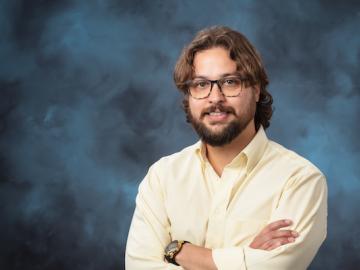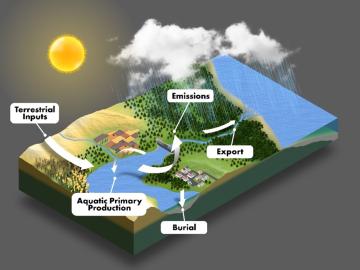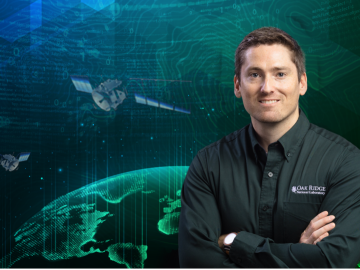
Filter News
Area of Research
- (-) Biology and Environment (84)
- (-) National Security (39)
- (-) Neutron Science (19)
- (-) Nuclear Science and Technology (19)
- Advanced Manufacturing (7)
- Biology and Soft Matter (1)
- Building Technologies (2)
- Computational Biology (1)
- Computational Engineering (3)
- Computer Science (15)
- Electricity and Smart Grid (3)
- Energy Science (140)
- Energy Sciences (1)
- Functional Materials for Energy (1)
- Fusion and Fission (28)
- Fusion Energy (15)
- Isotopes (26)
- Materials (70)
- Materials for Computing (15)
- Mathematics (1)
- Quantum information Science (7)
- Sensors and Controls (2)
- Supercomputing (138)
News Topics
- (-) Computer Science (49)
- (-) Frontier (5)
- (-) Fusion (10)
- (-) Grid (9)
- (-) Isotopes (7)
- (-) Machine Learning (22)
- (-) Polymers (3)
- (-) Security (13)
- 3-D Printing/Advanced Manufacturing (21)
- Advanced Reactors (13)
- Artificial Intelligence (26)
- Big Data (17)
- Bioenergy (54)
- Biology (79)
- Biomedical (32)
- Biotechnology (14)
- Buildings (3)
- Chemical Sciences (16)
- Clean Water (13)
- Composites (5)
- Coronavirus (23)
- Critical Materials (1)
- Cybersecurity (19)
- Energy Storage (14)
- Environment (101)
- Exascale Computing (5)
- Fossil Energy (1)
- High-Performance Computing (26)
- Hydropower (9)
- Materials (26)
- Materials Science (32)
- Mathematics (4)
- Mercury (7)
- Microscopy (13)
- Molten Salt (5)
- Nanotechnology (18)
- National Security (36)
- Neutron Science (122)
- Nuclear Energy (42)
- Partnerships (10)
- Physics (13)
- Quantum Computing (1)
- Quantum Science (8)
- Simulation (15)
- Space Exploration (8)
- Summit (16)
- Transportation (10)
Media Contacts

Tomás Rush began studying the mysteries of fungi in fifth grade and spent his college intern days tromping through forests, swamps and agricultural lands searching for signs of fungal plant pathogens causing disease on host plants.

ORNL researchers are deploying their broad expertise in climate data and modeling to create science-based mitigation strategies for cities stressed by climate change as part of two U.S. Department of Energy Urban Integrated Field Laboratory projects.

ORNL has provided hydropower operators with new data to better prepare for extreme weather events and shifts in seasonal energy demands caused by climate change.

In human security research, Thomaz Carvalhaes says, there are typically two perspectives: technocentric and human centric. Rather than pick just one for his work, Carvalhaes uses data from both perspectives to understand how technology impacts the lives of people.

When Hurricane Maria battered Puerto Rico in 2017, winds snapped trees and destroyed homes, while heavy rains transformed streets into rivers. But after the storm passed, the human toll continued to grow as residents struggled without electricity for months. Five years later, power outages remain long and frequent.

Global carbon emissions from inland waters such as lakes, rivers, streams and ponds are being undercounted by about 13% and will likely continue to rise given climate events and land use changes, ORNL scientists found.

When Matt McCarthy saw an opportunity for a young career scientist to influence public policy, he eagerly raised his hand.

Cameras see the world differently than humans. Resolution, equipment, lighting, distance and atmospheric conditions can impact how a person interprets objects on a photo.

When the COVID-19 pandemic stunned the world in 2020, researchers at ORNL wondered how they could extend their support and help

Chemical and environmental engineer Samarthya Bhagia is focused on achieving carbon neutrality and a circular economy by designing new plant-based materials for a range of applications from energy storage devices and sensors to environmentally friendly bioplastics.


